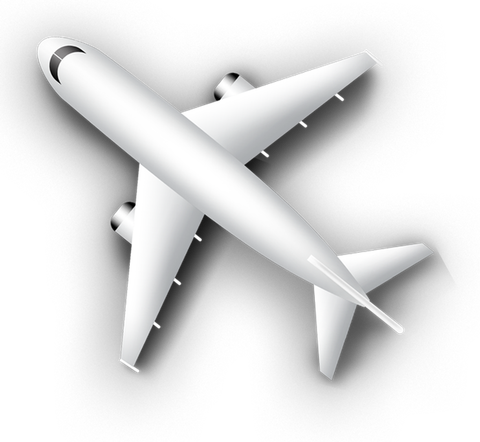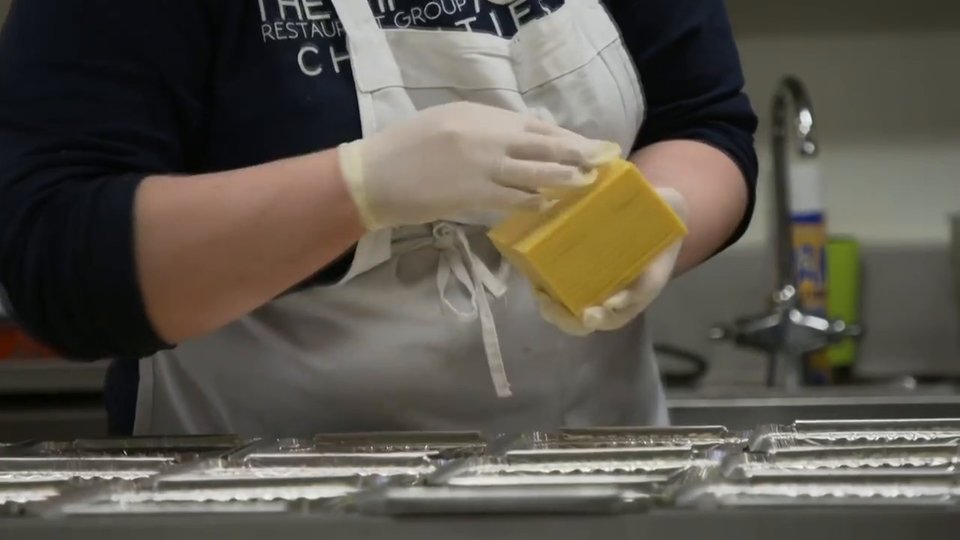Operations
Grounded:
how the aviation industry rallied to fight Covid-19
From donating to food banks to flying medical staff throughout Europe, the aviation sector has played a key role in providing support and relief during the coronavirus pandemic. Adele Berti takes a look at some of the positive contributions made by those working in the industry during the crisis.
Image:
UN carries out Solidarity Flights
The United Nations (UN) is coordinating major airlift operations to deliver face shields, gloves, goggles, gowns, masks, medical aprons and thermometers to struggling countries around the world. These have been called ‘Solidarity Flights’.
Organised by the UN’s World Food Programme and the World Health Organization (WHO), the first of these flights left Ethiopia in mid-April and delivered over one million supplies to Djibouti, Sudan, Eritrea, Somalia and Tanzania.
The scheme is part of a wider effort to provide help, equipment and staff to the 95 countries most at risk from the pandemic. Since the first flight, the WHO has managed to ship millions of personal protective equipment items to 133 countries and diagnostic kits to 126 countries.
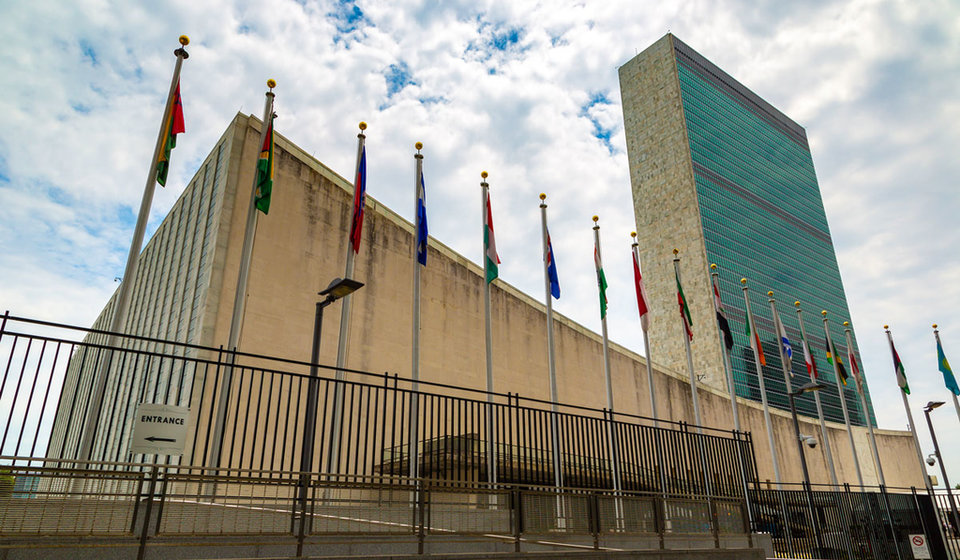
UN headquarters in New York City, US. Image: S-F / Shutterstock.com
British airports rally to provide help
The British aviation community has been providing relief and support to those in need since a lockdown was enforced in the UK in March.
The Heathrow Community Trust, for example, set aside £95,000 in rapid emergency funding for local community groups responding to the crisis. Meanwhile, London City Airport donated £50,000 to local food banks, some of which saw demand surge by over 300% at the beginning of lockdown. Luton Airport also joined these initiatives by donating around 100,000 confiscated items collected from passengers at airport security to the Luton Foodbank.
Outside of London, Manchester Airport provided support to local charities by offering grants through its own fund. In addition, Birmingham Airport agreed to use one of its hangars as a temporary mortuary for coronavirus victims.
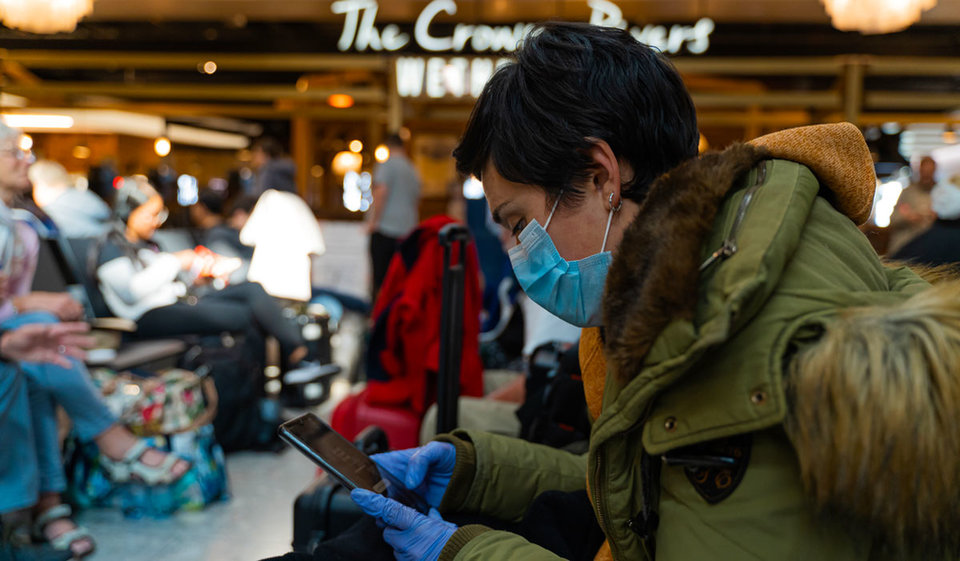
Masks being worn at Heathrow Airport, UK. Image: Heretheplanet / Shutterstock.com
Leonardo flies medical supplies across Italy
When Italy plunged into a strict quarantine in late March, local aerospace and defence group Leonardo embarked on a number of solidarity initiatives to support the country’s struggling healthcare sector.
These included deploying two of its aircraft for shuttle flights between Italian airports to deliver medical supplies across the country. Further help came from the company’s Helicopter division, which made available pilots and helicopters for civil protection duties.
In addition, Leonardo devoted three of its regional sites to 3D printing valves and launched a two-month free-of-charge threat intelligence service to 100 companies needing to improve their cyber resilience during the pandemic.

Leonardo da Vinci-Fiumicino Airport in Rome, Italy. Image: PalSand / Shutterstock.com
Airbus 3D prints protective equipment in Europe
Despite facing a severe slowdown in construction as a result of the crisis, multinational airliner manufacturer Airbus made its contribution by 3D printing visor frames for protective face masks at its sites in Spain, Germany and France, as well as ventilators in the UK.
The company’s helicopter division also worked on a solution to separate the cockpit from the cabin and protect pilots when flying infected patients throughout France. It has also been delivering face masks for healthcare workers throughout Europe.
Meanwhile, Airbus’ BizLab start-up innovation unit is collaborating with the startupsagainstcorona.com platform in support of companies during the pandemic.
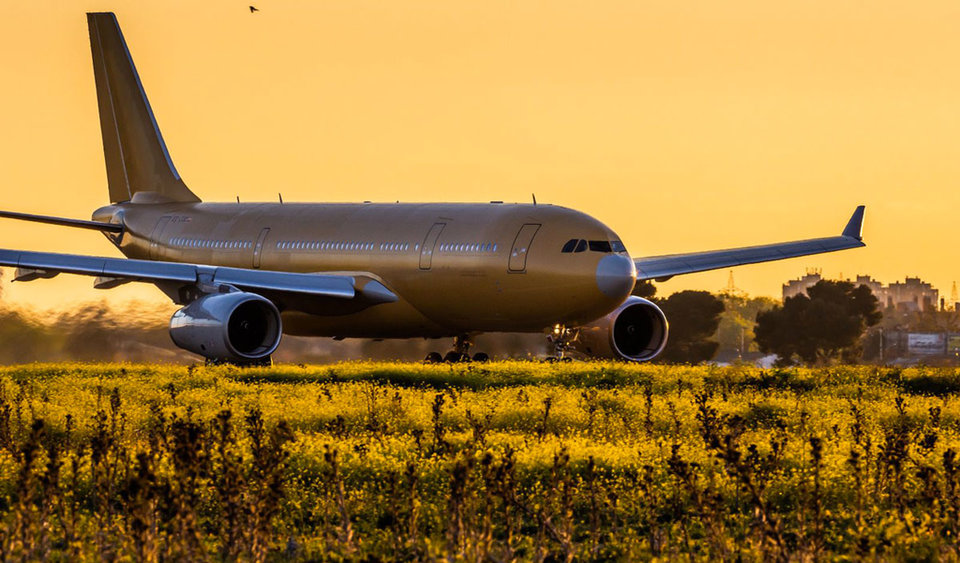
Boxes of protective face masks being unloaded from an A330-200. Image: Airbus
National Aviation Services sends testing kits to the Ugandan Ministry of Health
Global aviation services provider National Aviation Services (NAS) recently donated 7,000 testing kits to the Ugandan Covid-19 National Task Force launched by the local Ministry of Health.
The kits, which are being used for antibody tests, are part of the nation’s effort to determine the rate of immunity among the population. They show results within 15 minutes of the test being taken. According to NAS, the equipment was first procured in Kuwait - where the company is based - and then flown to Entebbe International Airport in Uganda.
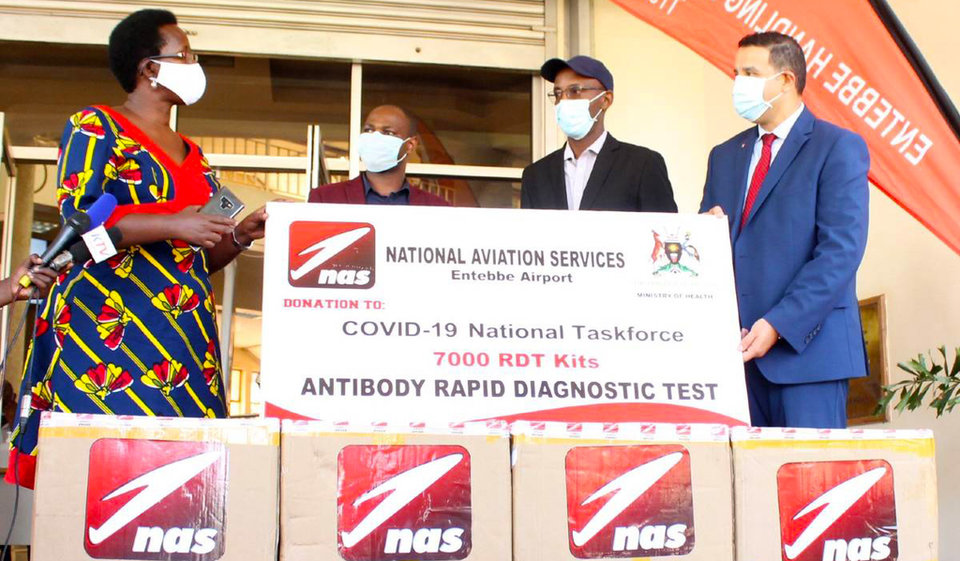
Image: NAS
Aviation Without Borders provides free flights French medical personnel
Hundreds of doctors, nurses and other medical staff in France and Europe flew for free during the pandemic thanks to the work of NGO Aviation Sans Frontières (Aviation Without Borders).
The organisation collaborated with industry stakeholders like Dassault Aviation to transport essential workers to areas in need via private jets. While the initiative is now no longer in service - as lockdown measures are being eased - the NGO managed to move over 300 people during the toughest months of lockdown.
Alongside this initiative, Aviation Sans Frontières also collaborated with NGO Air Affaires to set up a platform that provides aircraft on demand. Since the launch of the platform, over 500 professional pilots and owners of private planes signed up to help.
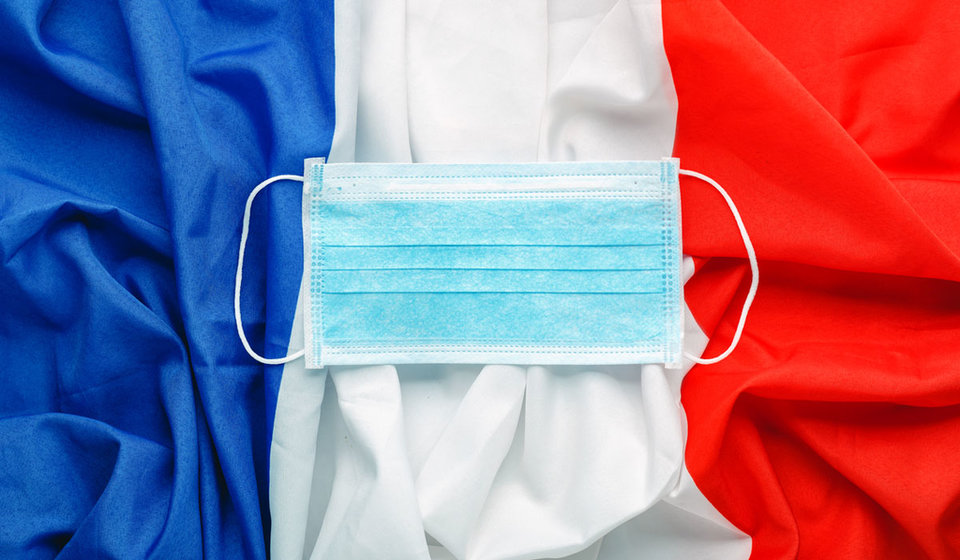
Air BP fuels aircraft all over the world
Despite oil prices plummeting to record lows, earlier this year BP donated around three million gallons of jet fuel to FedEx Express EXPR charter flights and Alaska Airlines to help them deliver essential materials to affected areas.
Meanwhile, the company’s Australian branch sent 35,000 N95 masks to the Royal Flying Doctor Service and its frontline workers. In Europe, Air BP also supported Aviation Sans Frontières’ work to fly medical staff for free; its UK division provided fuel to a number of UK air ambulance services across the country.
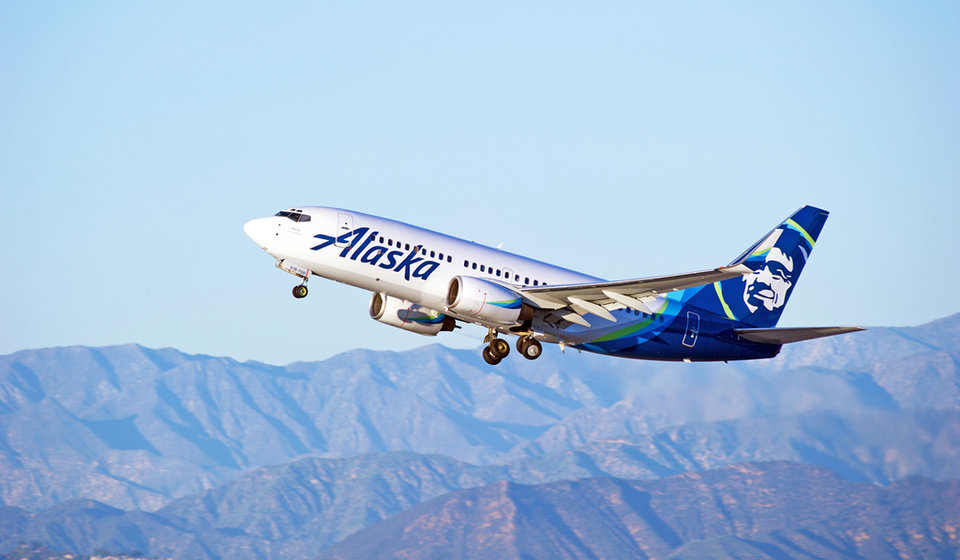
Image: Philip Pilosian / Shutterstock.com
US airlines donate to food centres
All major US liners provided relief by donating food and other products to charities across the country. American Airlines, for example, donated 25,000 meals to an organisation that feeds restaurant staff left unemployed during the pandemic.
Delta followed a similar path by sending 200,000lbs (90,700kg) of food that was initially destined for flights and lounges to frontline workers. The company further provided aid to resource and crisis centres in Missouri and Georgia. Southwest Airlines similarly donated $400,000 worth of provisions to food banks within the Feeding America network.
Lastly, United Airlines repurposed one of its cargo facilities at George Bush Intercontinental Airport in Huston into a food centre and sent 160,000lbs (around 72,000kg) of food to hospitals and relief centres.
Video: American Airlines
Aéroports de Paris gives out tablets to patients in Paris hospitals
Groupe Aéroports de Paris used its corporate foundation and its digital technologies subsidiary Hub One to donate some 200,000 digital tablets to help patients remain in contact with their loved ones while in hospital.
Groupe ADP - which operates Charles de Gaulle Airport, Orly Airport and Le Bourget Airport in the French capital - also made available warehouse logistics staff from its airport community to provide further support.
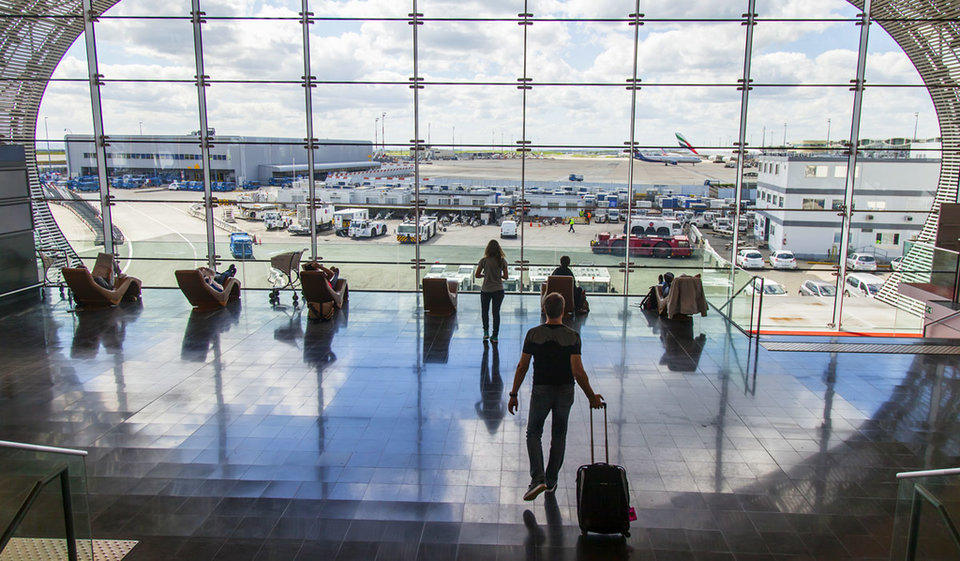
Charles de Gaulle Airport in Paris, France. Image: bellena / Shutterstock.com
Luxaviation Group gives lifeline to business aviation industry
In mid-March, Luxembourg-based private jet operator Luxaviation Group launched its European Business Aviation Solidarity Initiative, a three-month scheme during which the company shared its expertise in procurement, purchasing power and finance resources with business aviation companies.
Available throughout Europe, the initiative allowed participating jet operators to obtain the same pricing from suppliers as Luxaviation Group, as well as access to documents that would help them reduce costs.
“We build our business on resources that smaller operators are lacking during lockdown,” commented Luxaviation Group CEO Patrick Hansen. “This initiative allows them to focus their limited resources on keeping their clients and assets safe, which is paramount to keep the industry as healthy as possible.”
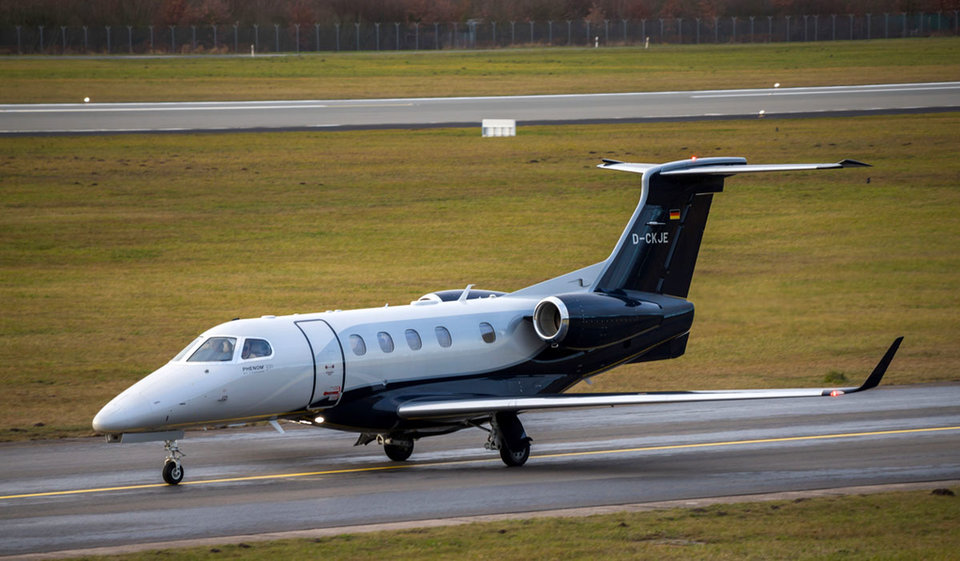
Image: RikoBest / Shutterstock.com
UN carries out Solidarity Flights
The United Nations (UN) is coordinating major airlift operations to deliver face shields, gloves, goggles, gowns, masks, medical aprons and thermometers to struggling countries around the world. These have been called ‘Solidarity Flights’.
Organised by the UN’s World Food Programme and the World Health Organization (WHO), the first of these flights left Ethiopia in mid-April and delivered over one million supplies to Djibouti, Sudan, Eritrea, Somalia and Tanzania.
The scheme is part of a wider effort to provide help, equipment and staff to the 95 countries most at risk from the pandemic. Since the first flight, the WHO has managed to ship millions of personal protective equipment items to 133 countries and diagnostic kits to 126 countries.

UN headquarters in New York City, US. Image: S-F / Shutterstock.com
British airports rally to provide help
The British aviation community has been providing relief and support to those in need since a lockdown was enforced in the UK in March.
The Heathrow Community Trust, for example, set aside £95,000 in rapid emergency funding for local community groups responding to the crisis. Meanwhile, London City Airport donated £50,000 to local food banks, some of which saw demand surge by over 300% at the beginning of lockdown. Luton Airport also joined these initiatives by donating around 100,000 confiscated items collected from passengers at airport security to the Luton Foodbank.
Outside of London, Manchester Airport provided support to local charities by offering grants through its own fund. In addition, Birmingham Airport agreed to use one of its hangars as a temporary mortuary for coronavirus victims.

Masks being worn at Heathrow Airport, UK. Image: Heretheplanet / Shutterstock.com
Leonardo flies medical supplies across Italy
When Italy plunged into a strict quarantine in late March, local aerospace and defence group Leonardo embarked on a number of solidarity initiatives to support the country’s struggling healthcare sector.
These included deploying two of its aircraft for shuttle flights between Italian airports to deliver medical supplies across the country. Further help came from the company’s Helicopter division, which made available pilots and helicopters for civil protection duties.
In addition, Leonardo devoted three of its regional sites to 3D printing valves and launched a two-month free-of-charge threat intelligence service to 100 companies needing to improve their cyber resilience during the pandemic.

Leonardo da Vinci-Fiumicino Airport in Rome, Italy. Image: PalSand / Shutterstock.com
Airbus 3D prints protective equipment in Europe
Despite facing a severe slowdown in construction as a result of the crisis, multinational airliner manufacturer Airbus made its contribution by 3D printing visor frames for protective face masks at its sites in Spain, Germany and France, as well as ventilators in the UK.
The company’s helicopter division also worked on a solution to separate the cockpit from the cabin and protect pilots when flying infected patients throughout France. It has also been delivering face masks for healthcare workers throughout Europe.
Meanwhile, Airbus’ BizLab start-up innovation unit is collaborating with the startupsagainstcorona.com platform in support of companies during the pandemic.

Boxes of protective face masks being unloaded from an A330-200. Image: Airbus
National Aviation Services sends testing kits to the Ugandan Ministry of Health
Global aviation services provider National Aviation Services (NAS) recently donated 7,000 testing kits to the Ugandan Covid-19 National Task Force launched by the local Ministry of Health.
The kits, which are being used for antibody tests, are part of the nation’s effort to determine the rate of immunity among the population. They show results within 15 minutes of the test being taken. According to NAS, the equipment was first procured in Kuwait - where the company is based - and then flown to Entebbe International Airport in Uganda.

Image: NAS
Aviation Without Borders: free flights for French medical personnel
Hundreds of doctors, nurses and other medical staff in France and Europe flew for free during the pandemic thanks to the work of NGO Aviation Sans Frontières (Aviation Without Borders).
The organisation collaborated with industry stakeholders like Dassault Aviation to transport essential workers to areas in need via private jets. While the initiative is now no longer in service - as lockdown measures are being eased - the NGO managed to move over 300 people during the toughest months of lockdown.
Alongside this initiative, Aviation Sans Frontières also collaborated with NGO Air Affaires to set up a platform that provides aircraft on demand. Since the launch of the platform, over 500 professional pilots and owners of private planes signed up to help.

Air BP fuels aircraft all over the world
Despite oil prices plummeting to record lows, earlier this year BP donated around three million gallons of jet fuel to FedEx Express EXPR charter flights and Alaska Airlines to help them deliver essential materials to affected areas.
Meanwhile, the company’s Australian branch sent 35,000 N95 masks to the Royal Flying Doctor Service and its frontline workers. In Europe, Air BP also supported Aviation Sans Frontières’ work to fly medical staff for free; its UK division provided fuel to a number of UK air ambulance services across the country.

Image: Philip Pilosian / Shutterstock.com
US airlines donate to food centres
All major US liners provided relief by donating food and other products to charities across the country. American Airlines, for example, donated 25,000 meals to an organisation that feeds restaurant staff left unemployed during the pandemic.
Delta followed a similar path by sending 200,000lbs (90,700kg) of food that was initially destined for flights and lounges to frontline workers. The company further provided aid to resource and crisis centres in Missouri and Georgia. Southwest Airlines similarly donated $400,000 worth of provisions to food banks within the Feeding America network.
Lastly, United Airlines repurposed one of its cargo facilities at George Bush Intercontinental Airport in Huston into a food centre and sent 160,000lbs (72,000kg) of food to hospitals and relief centres.
Video: American Airlines
Aéroports de Paris gives out tablets to patients in Paris hospitals
Groupe Aéroports de Paris used its corporate foundation and its digital technologies subsidiary Hub One to donate some 200,000 digital tablets to help patients remain in contact with their loved ones while in hospital.
Groupe ADP - which operates Charles de Gaulle Airport, Orly Airport and Le Bourget Airport in the French capital - also made available warehouse logistics staff from its airport community to provide further support.

Charles de Gaulle Airport in Paris, France. Image: bellena / Shutterstock.com
Luxaviation Group gives lifeline to business aviation industry
In mid-March, Luxembourg-based private jet operator Luxaviation Group launched its European Business Aviation Solidarity Initiative, a three-month scheme during which the company shared its expertise in procurement, purchasing power and finance resources with business aviation companies.
Available throughout Europe, the initiative allowed participating jet operators to obtain the same pricing from suppliers as Luxaviation Group, as well as access to documents that would help them reduce costs.
“We build our business on resources that smaller operators are lacking during lockdown,” commented Luxaviation Group CEO Patrick Hansen. “This initiative allows them to focus their limited resources on keeping their clients and assets safe, which is paramount to keep the industry as healthy as possible.”

Image: RikoBest / Shutterstock.com
